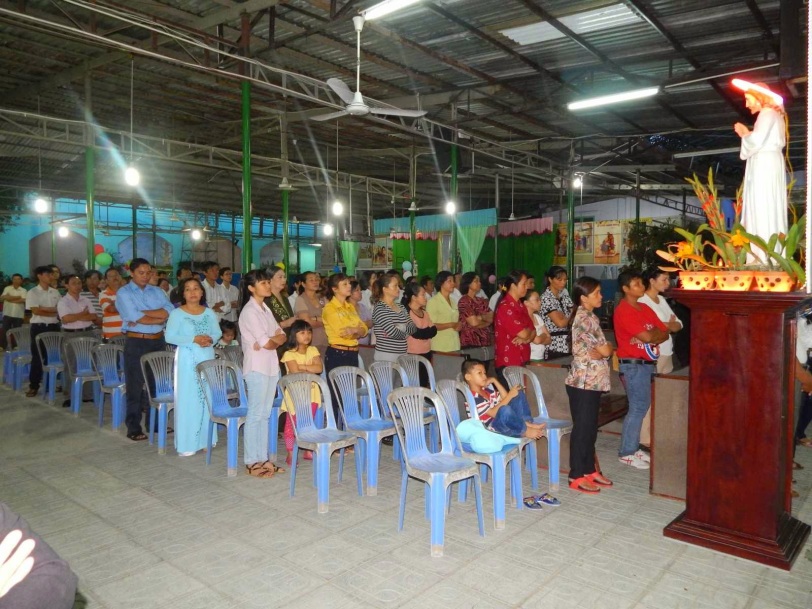Having lived in Việt Nam for seven months now, I have to say I have learned a lot, especially, in the form of communication.
With differences in language and customs I find myself having trouble even in the most simple of interactions.
In situations, mainly at a restaurant or a market, I tend to overcompensate my lack of verbal communication with hand motions.
Most of the time, this works out.
Unfortunately, just like spoken language, hand signals and body language have different meanings and have the ability to offend people.
If you find yourself in Việt Nam attempting to non-verbally communicate, here are a few things I have learned that could help you not send the wrong message.
When trying to get someone to come to you, let’s say a waitress at a restaurant, do not point your finger and flex it toward your body as we do in America.
If you use this method to beckon a Vietnamese local they may get upset.
This is because this is how you call for an animal or a small child.
Furthermore, beckoning signifies that that person has a lower class than you, so it can be very upsetting to older Vietnamese.
Instead, keep your palm down and flex your entire hand, this will keep everyone happy.
With practice I have come to break this miscommunication.
I was recently attending a concert taking pictures of some friends, when I asked them to pose for the camera they stuck up their middle finger.

In Việt Nam, this is how you call for an animal or a small child
I thought they were trying to ruin the picture because in America this is the most offensive hand signal that can be made.
Commonly used by angry drivers it is a way to tell another person off.
In Việt Nam, however, this is not the case.
The middle finger is simply another counting number.
The middle finger and index finger to them coordinate by taking turns as the number one.
Commonly, Vietnamese people point to things and ask for one item of something by putting up their middle fingers.
So, if you see a Vietnamese person giving you the finger, they likely have no idea they could be offending you.
Many times sitting on the side of the street, I have found myself approached by people selling things that I do not want to buy.
When I moved to Việt Nam, I would shake my head “no, thank you” and persistent sellers would continue to test my patience.
Thanks to friendly observation, I quickly learned that unlike America, where a left to right shake of the head means no, the Vietnamese use a hand motion to communicate the word no.
Using your open hand, palm up, simply twist it back and forth and the salesperson will get the message.
While shopping, I’ve even received shopkeepers giving me two hands, when they don’t agree on selling me something for the price I ask.
Learning my way around this city has been an eventful feat in itself.
One time I told one of my Vietnamese friends to “wish me luck” as I had to cross downtown during rush hour.
Subconsciously, I simultaneously, crossed my fingers when saying this.
My friend stopped me and asked:
“Why did you cross your fingers?”
I explained to her that in America crossing your fingers is a sign of good luck.

In Việt Nam, crossing your fingers is considered a rude and disrespectful gesture
We sometimes even cross our fingers for luck when we’re waiting for good news or the results of a test.
After repeating this to her, she laughed and continued to explain to me that in Việt Nam, this is not the case.
She told me that crossing your fingers is considered a rude and disrespectful gesture that refers to part of the female anatomy.
After learning this I was thankful she told me before I upset any other locals around me.
Public displays of affection between a man and a woman, such as holding hands or kissing, are generally accepted in the western world, and can seemingly go unnoticed.
But while in Việt Nam, I tend to notice less co-ed displays of affection.
More often than not I will see girls and, or, older women holding hands or linking arms with their girl friends.
While most Vietnamese realize that westerners have different behaviors in public, and may not care if you and your significant other hold hands, kissing will still likely cause offense.
Personally, this does not bother me, because I have never been a big fan of public displays of affection.
This brings me to my last gesture, the crossing of the arms.

In Việt Nam, the ordinary posture people use while praying is arms folded
Back home when I am talking to someone with their arms crossed I tend to think they are mad at me or are trying to cover something up.
However, I have learned that if you’re speaking to your Vietnamese friend and they cross their arms you may think the same, but fear not.
The act of crossing your arms also has a different meaning in Việt Nam.
Instead of something that is done when someone is upset, here crossing your arms is considered a sign of respect.
Remember, communicating in Việt Nam, especially when you don’t speak the language, is difficult for most westerners.
But, if you remember these non-verbal differences at least you can save yourself some embarrassment and keep the inadvertent offending at a minimum.
By ANGELA SCHONBERG
Source: Tuổi Trẻ News
Thanks for this it was very interesting 🙂
I’m a Vietnamese and I accidentally come here when I’m looking for body language. It’s a good article but I have something to tell you. Firstly, in big city (HCMC, Hanoi,…), we are influenced by mass multimedia, thus, do NOT use your middle finger when you want to point at someone or something. The middle finger should never be alone when you do a gesture (combine it with other fingers). Secondly, Vietnamese girls tend to link arms with other girls, it means that they are close friends/ sisters … (because girls are emotional) and my mother like to link arms with me (I’m a 21-year-old man) in public (mother loves son, that’s all). Don’t think that they are lesbian or something (for the boys, they NEVER hold hand or link arm with other boys >.<). Lastly, crossing arms does not mean respect, it means they are to watch/listen to you carefully and consider it.
Since when crossing fingers meant something so gross and not true? Up until now, I’ve never heard about that – not even once. And I cross my fingers all the time – for luck! My friends also do that and we never ever consider crossing fingers means something obscene. :-O
May we know you left Vietnam at what age?
I was born and raised in Hanoi. I attended all the public schools, passed the university entrance to one of the best national universities in Hanoi & graduated with Distinction. I worked 2 years as a university teacher in Vietnam before moving abroad to pursue higher education. So you can be certain that I am old & Vietnamese enough to know what I am talking about. And next time, I suggest you to respond with good manners, because mocking others with questions like yours simply implies that you are not capable of answering my questions in the first place.
Your English is impeccable but good manners in online communication
require some understanding of other people background before jumping into any conclusion.
Anyway: “Up until now, I’ve never heard about that – not even once. And I cross my fingers all the time – for luck! “. Now is the time to appreciate other people’s perspectives and once again, thank you very much for your invaluable comments.
Great article. Very interesting 🙂
Great stuff, thank you!
PS – in the UK and other countries, beckoning a waiter with your finger is extremely rude. Just raise your hand!
Great article. Thank you very much for such interesting points to remember.
Another person here who never knew about the crossing fingers thing, not even for good luck until really late in life. I don’t think my friends and family know this either. Also, the middle finger is bad, except for when you can’t help it, like holding a pen and pointing at the same time (teachers do that a lot). As for my background, I lived in the south (HCMC and various provinces) until I finished high school, then I went to a Hanoi university for half a year before studying abroad. May I hear where your Vietnamese friend is from?
Pingback: Americans and their Behaviour: – udaytechtuts
I am not Vietnamese and I did not know anything about the culture before moving here, so I am not an expert in the least, but I have lived in Hoi An in central Vietnam for over a year and I have noticed the same rule about crossing your fingers. I teach English at a local English center and I taught my students the American sign language alphabet. For the letter R, you cross your fingers, much like we do in America for good luck. When I did this the whole class got very upset (I knew that this was supposed to be considered bad, but I was trying to not draw attention to it, since it was only to mean the letter R.) I tried to explain in American culture it’s a good thing and something we do often; their mouths fell open, they were appalled. My class (ages 9-15) could not get over it, so I stopped using the sign language. When I asked what it meant, they covered their mouths and shook their heads, it was so bad they wouldn’t tell me. It may not be a national cultural thing, but I have absolutely seen the same response as you have mentioned in your article to crossing your fingers. I’m sorry a couple commenters felt the need to attack you and your character for your personal experience and observations. Great article, thank you!
Haha, an interesting article indeed ! To help with the quarrel which you guys were having about the crossed fingers, I have a few things to say.
I was born and raised in Hà Nội, in fact, I was born to a family which already has its root 3 generations back in Hanoi. My family lives very close to the Hoan Kiem Lake (Center of Hanoi), and sometimes I am called “Downtown Boy” by friends and peers. My family is an ordinary family like everyone’s elses, nothing special at all, and I was taught all the etiquettes and manners that a Trang An (an old way of saying Hanoian) must have : from respecting the elders to conversational manners to “how to sit at meals with people”. Therefore, I believe that my knowledge and understanding of the Vietnamese culture is thorough and are all naturally acquried. So with that squared out of the way, I shall present my knowledge on this matter.
The answer is : YES and NO. It’s true that crossed fingers are to imply a female genital. I have seen my friends used that gesture to insult each other when I was in middle school. I went to one of them and asked what it meant, and their answer was : “It’s a vagina, are you blind?”. So, yes, I can confirm that what the gesture means Vagina, and it is for offending someone else. BUT, it’s rather unpopular. To my estimation, 1 out of 15 would know about it, and most of them are the 40s and above. That is the only occasion that I have seen the ” Crossed Fingers” are utilised as an insult; other than that, I have seen none. I don’t know if this gesture is more or less common in the South, but again, it does exist.
Thank you very much for your candid feedback.